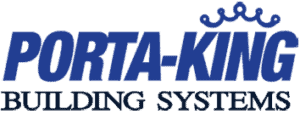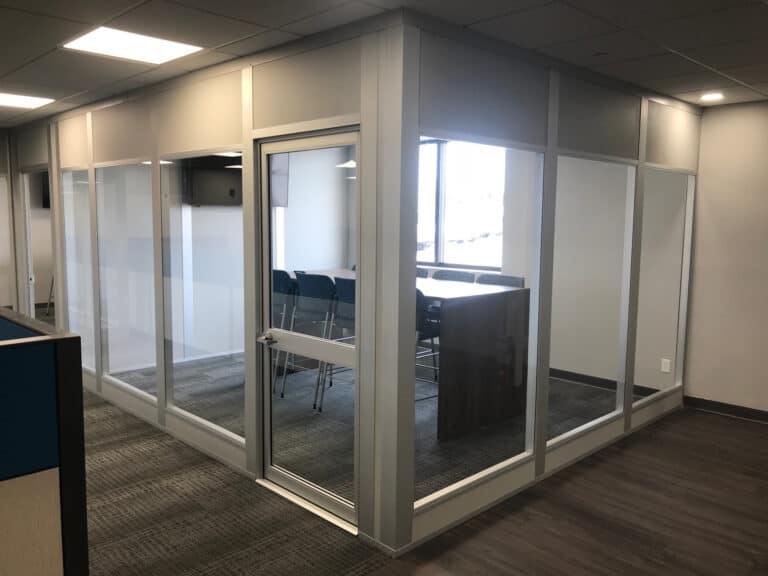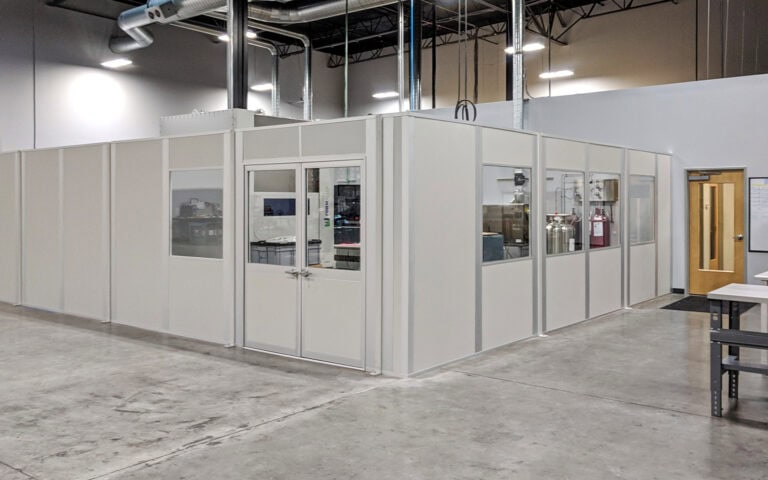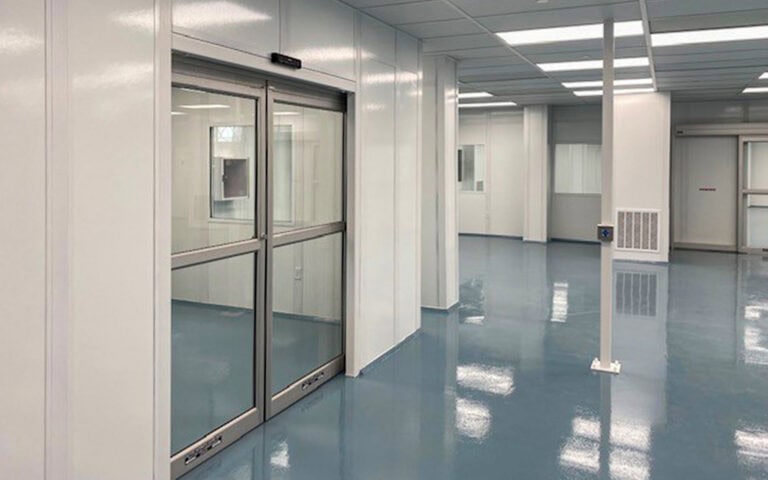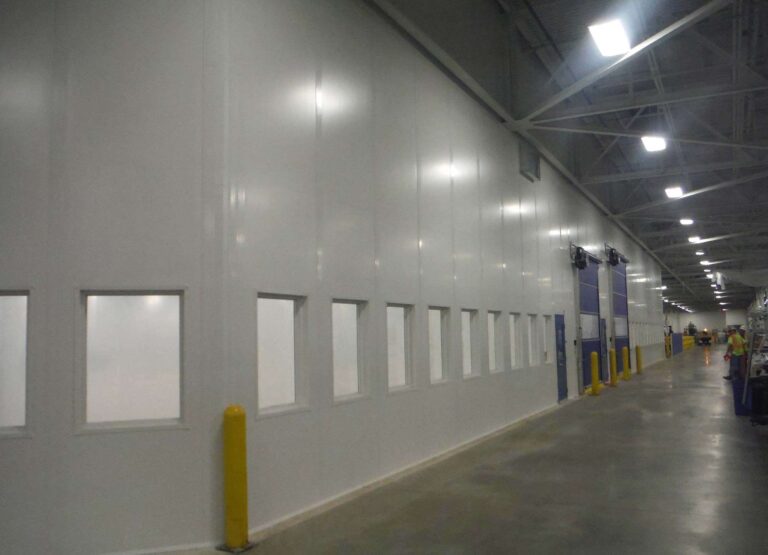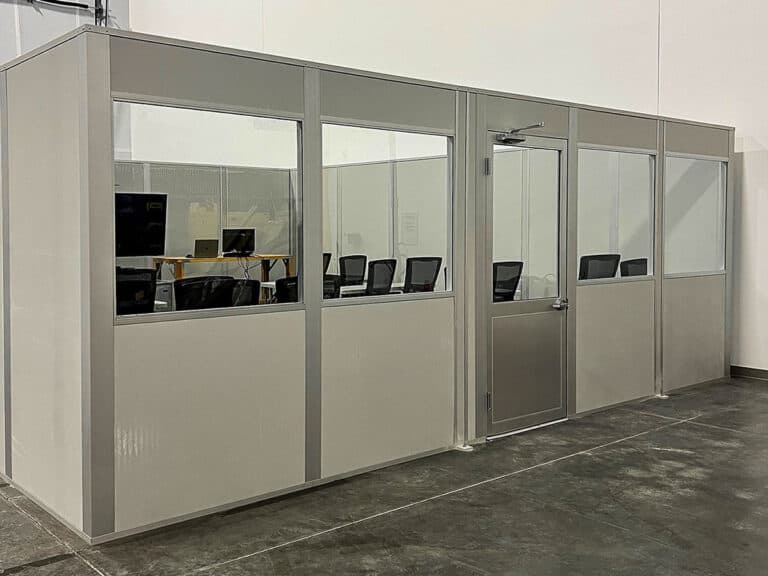Aesthetically & Physically Adaptable Modular Wall Designs for Changing Spaces
Whether you’re getting new employees, upgrading equipment, or simply want a fresh start to your office design, changing the layout of your workspace should be one of your more straightforward initiatives. Modular walls and Wall partitions are an economical and flexible solution to traditionally built walls. Porta-King custom builds wall partitions using standard components to:
- Create new spaces with easy to install modular walls. Ideal for any large space that needs to be subdivided into offices for new personnel or protective barriers for new equipment.
- Customize wall appearance with a wide array of wall panel colors and surface types. Windows are also available in a variety of glazing options to address both function and aesthetics.
- Reduce noise in loud environments like manufacturing facilities, with our sound attenuating wall designs. We offer many different wall compositions to address even the noisiest working conditions.
Diverse Usage Across a Range of Different Applications and Industry Types
In addition to applications in offices, modular walls and wall partitions can be used to divide work areas in manufacturing facilities, provide security around dangerous machinery, or to enhance privacy around sensitive work areas, just to name a few.
Modular Wall Video Gallery
This video demonstrates the ease with which a Porta-King Monolith modular wall system can be installed to subdivide large sections of manufacturing and warehouse space. The single panel you see being installed is 6″ thick and 24′ tall. The complete time lapse for a single panel installation was 20 minutes. This particular monolith panel is comprised of a white painted steel surface on both sides of an expanded polystyrene (EPS) core.
The completed 2 wall configuration consists of 2 walls and was a total of 164′ long. Both lengths of wall took a total of 3 days to assemble. This includes the installation of a single man door along with a large steel framed opening where a roll up door would be installed later.
Cut Down on Costs with a Sturdy & Green Design
Porta-King’s modular partitions are a long-term investment. Unlike traditional drywall, modular walls and wall partitions are designed for:
- Easy maintenance through prefinished, easy to clean surfaces
- Energy cost savings with solid insulating cores that help maintain the desired temperature of a room
- Future redesign savings with completely reusable components
Since you don’t have to tear down walls and start over with all new materials every time you need to redesign your office, modular walls create less construction waste and overall disruption. This ability is key to creating a cleaner, more efficient work environment at your facility.
Modular Wall Gallery








Frequently Asked Questions
What are modular walls and how do they differ from traditional construction?
Modular walls are pre-engineered, customizable wall systems that can be quickly installed and reconfigured as needed. Unlike traditional construction, modular walls offer greater flexibility, faster installation times, and cleaner construction processes. They’re composed of prefabricated panels and components that can be easily assembled on-site, making them ideal for various applications in commercial, industrial, and specialized environments.
What types of modular wall systems does Porta-King offer?
Porta-King offers several types of modular wall systems to suit different needs:
– Freestanding walls for creating separate spaces within larger areas
– Modular office partitions for flexible office layouts
– Modular cleanroom walls for controlled environments
– Modular tall walls for high-ceiling applications
Each system is designed to meet specific requirements in terms of height, finish, and functionality.
What are the main benefits of using modular walls?
The key benefits of modular walls include:
– Faster installation compared to traditional construction
– Cleaner construction process with less dust and debris
– Flexibility to reconfigure or relocate as needs change
– Variety of finishes and customization options
– Potential cost savings over time due to reusability
– Integration of electrical and data systems within the walls
– Compliance with various building codes and standards
Can modular walls accommodate doors, windows, and other features?
Yes, modular wall systems can be designed to incorporate various features such as:
– Single, double, and sliding doors
– Fixed or operable windows
– Electrical outlets and data ports
– Sound insulation
– Structural support for shelving or equipment mounting
The specific options available may vary depending on the type of modular wall system chosen.
How tall can modular walls be built?
The maximum height of modular walls depends on the specific system and design requirements. Porta-King offers solutions that can reach up to 40 feet in height for certain applications. The appropriate height is determined based on factors such as the intended use, structural considerations, and local building codes.
Are modular walls suitable for cleanroom environments?
Yes, Porta-King offers specialized modular wall systems designed for cleanroom applications. These walls feature non-shedding surfaces and materials that meet stringent cleanliness standards. They can be customized to accommodate various cleanroom classifications and specific process requirements.
How do modular walls compare in cost to traditional construction methods?
While the initial material cost of modular walls may be higher than traditional drywall construction, they often provide cost savings in other areas:
– Reduced installation time and labor costs
– Minimal disruption to ongoing operations
– Lower long-term costs due to reconfigurability and reusability
– Potential tax benefits as they may be classified as equipment rather than permanent structures
It’s important to consider the total cost of ownership when comparing modular walls to traditional construction.
Can modular walls be easily reconfigured or relocated?
Most modular wall systems are designed for flexibility and can be reconfigured or relocated with relative ease. However, the level of ease depends on the specific system and how it’s installed. Some systems, like freestanding walls, may require more effort to move due to their structural support requirements. It’s best to consult with the manufacturer for specific reconfiguration capabilities of each system.
What finishes are available for modular walls?
Modular walls come in a wide range of finishes to suit various aesthetic and functional requirements. Common options include:
– Vinyl-covered drywall
– Painted steel or aluminum
– Fiberglass Reinforced Plastic (FRP)
– Melamine
The choice of finish often depends on the application, such as office spaces, industrial environments, or cleanrooms.
How long does it typically take to install modular walls?
The installation time for modular walls is generally much faster than traditional construction methods. However, the exact timeline depends on factors such as:
– The size and complexity of the project
– The type of modular wall system being installed
– Site preparation requirements
– Any custom features or integrations needed
For a more accurate estimate, it’s best to consult with Porta-King or an authorized installer who can assess your specific project requirements.
